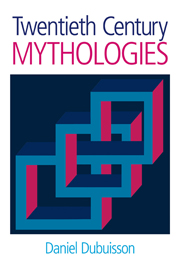Book contents
- Frontmatter
- Epigraph
- Contents
- Foreword by Professor Robert A. Segal
- Preface
- Abbreviations
- Introduction: History and comparative epistemology
- Part I Georges Dumézil, or Society
- Part II Claude Lévi-Strauss, or the Mind
- Part III Mircea Eliade, or the Sacred
- Conclusion: Modern theories of myth and the history of Western thought
- Bibliography
- Index
Preface
- Frontmatter
- Epigraph
- Contents
- Foreword by Professor Robert A. Segal
- Preface
- Abbreviations
- Introduction: History and comparative epistemology
- Part I Georges Dumézil, or Society
- Part II Claude Lévi-Strauss, or the Mind
- Part III Mircea Eliade, or the Sacred
- Conclusion: Modern theories of myth and the history of Western thought
- Bibliography
- Index
Summary
The first edition of this book, published in French in 1993, elicited numerous and quite lively reactions. In fact the third part, devoted less to the personality than to the controversial work of Mircea Eliade, attracted most of these reactions. It is true that, for the first time, the foundations of his work were clearly put into perspective with what was beginning to be known of Eliade's Romanian history, a history he himself had hitherto wisely kept hidden or somewhat masked. For the first time, following the path beginning to be cleared in 1987 by Ivan Strenski, Eliade's fascist allegiance and violent anti-Semitism, his praise for the Salazarist regime, his admiration of Gnostic and esoteric currents of Western thought (represented in his time by René Guénon and Julius Evola), his obsessive elitism, his rejection of the Enlightenment legacy (democracy, equal rights, social justice), and his disdain for all humanistic morality were presented as being at one and the same time a collection of coherent ideological facts and indispensable keys to understanding his work. Nor were these symptoms of something “inconsequential,” an “aberration” that could be posited as “transitory,” since he had displayed these sorts of behaviour from the 1930s through to the defeat of Nazi Germany and its allies.
This way of regarding things clashed violently with the bland if not affected commentaries and spiritual lyricism almost always evoked by Eliade's books before now.
- Type
- Chapter
- Information
- Twentieth Century Mythologies , pp. xv - xviiiPublisher: Acumen PublishingPrint publication year: 2006



